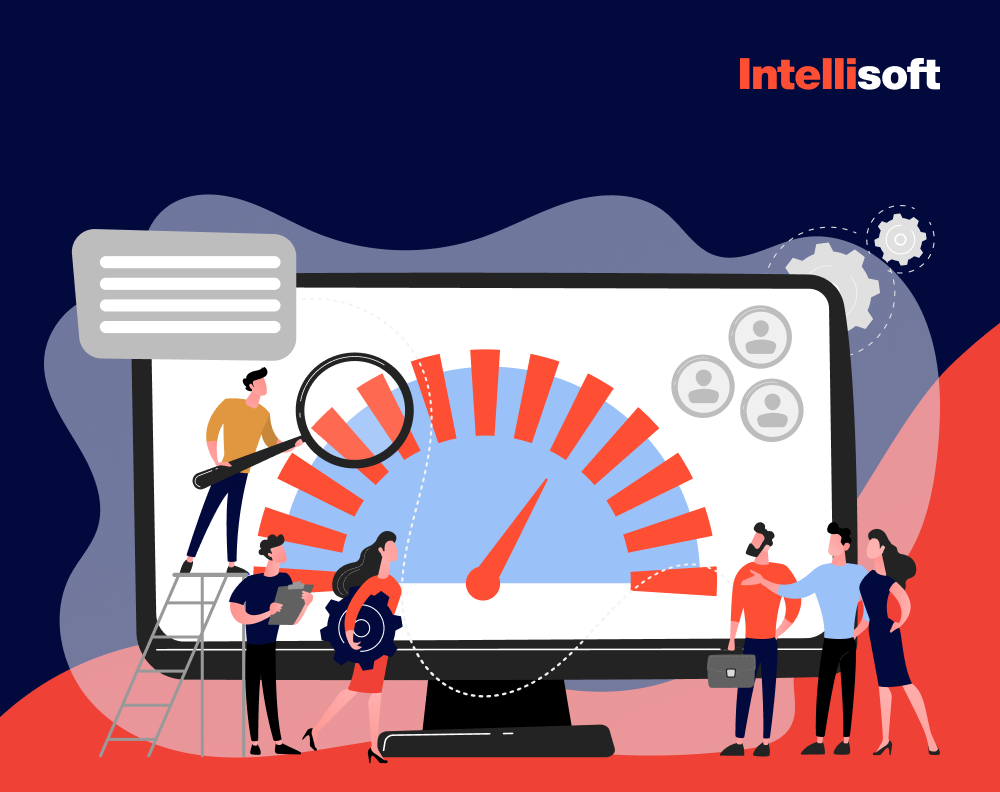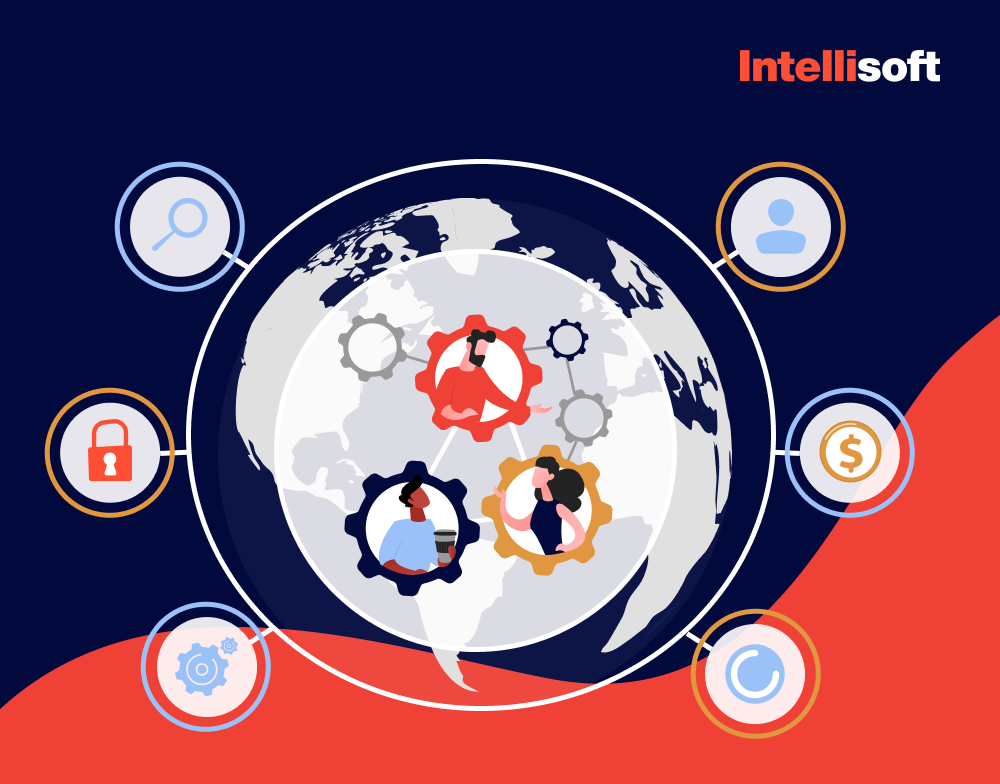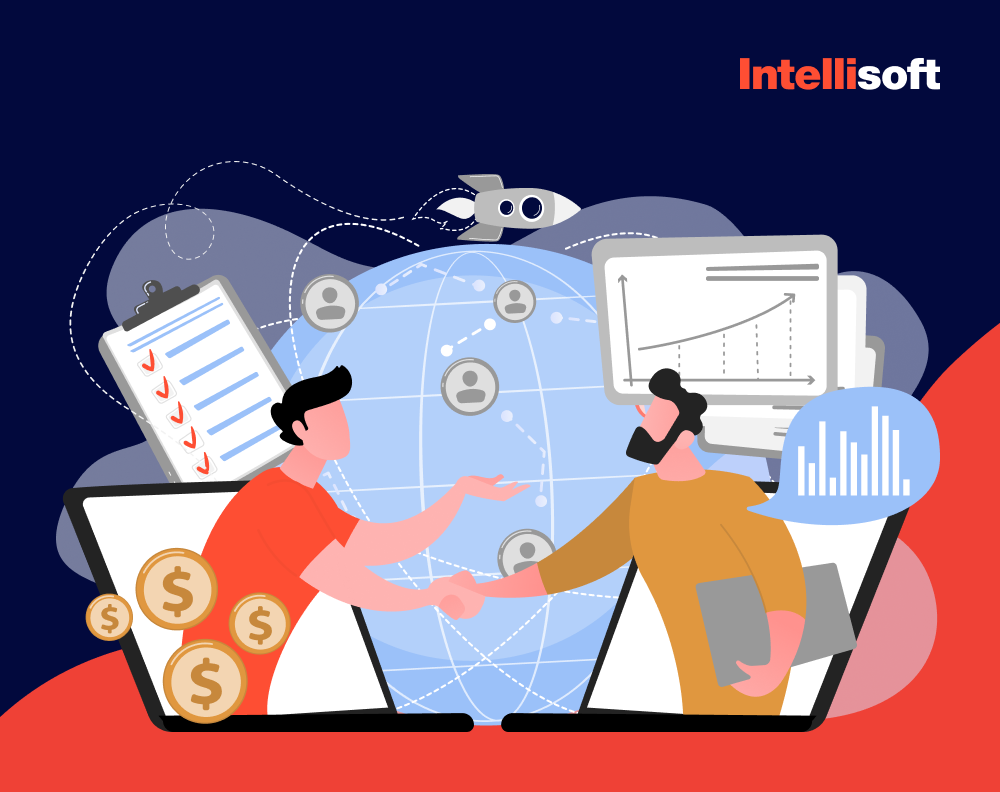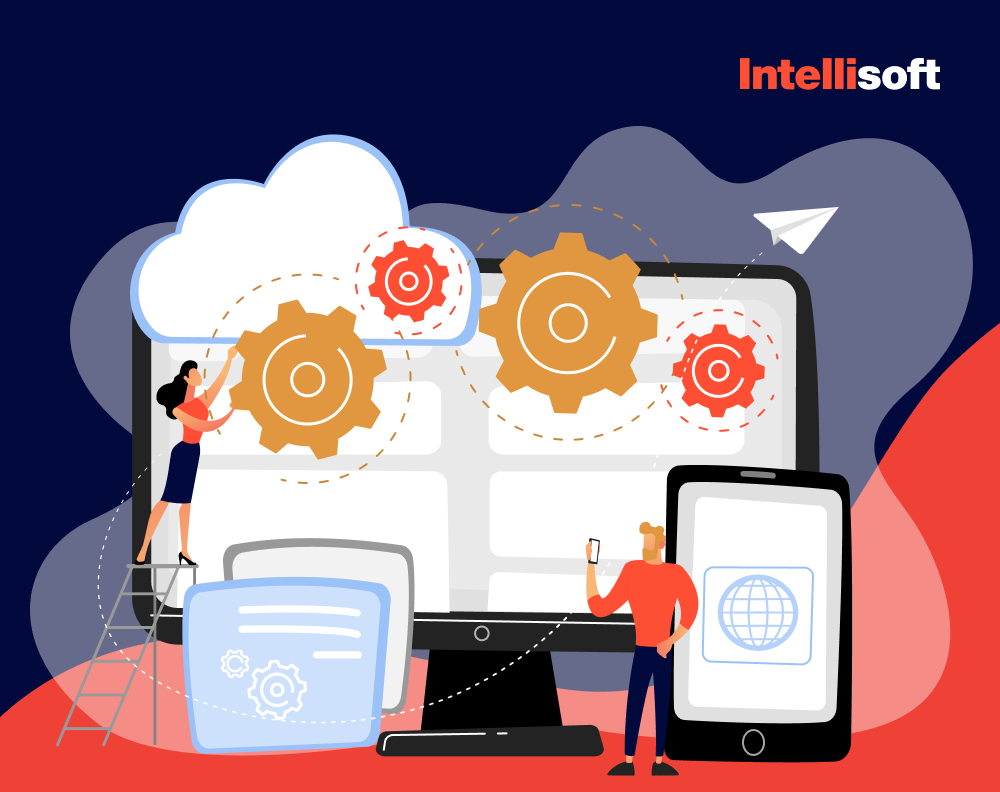Imagine this: you’ve identified the perfect candidate to fill a critical role on your team. They possess the skills, experience, and drive to make a real impact. But before celebrating, a sobering reality sets in – the recruitment process itself can be a hefty financial investment.
Studies by the Society for Human Resource Management (SHRM) show the average cost per hire (CPH) in the US sits around $4,700. However, this figure is just the tip of the iceberg. Depending on your industry and the seniority of the role, that number can easily balloon to several times higher.
So, the burning question remains: what is the average cost per hire by industry? The answer lies in understanding your CPH. This metric goes beyond just salary and benefits, encompassing the entire recruitment journey – from advertising and screening to interviewing and onboarding. By analyzing your CPH, you can uncover hidden inefficiencies in your hiring process, potentially revealing areas where precious resources are being wasted.
Here at IntelliSoft, with over 15 years of experience navigating the complexities of recruitment, we can help you demystify your average cost per hire by industry. In this article, we’ll not only equip you with the knowledge to calculate your CPH, but also offer actionable strategies to streamline your hiring process and get the best talent on board without breaking the bank.
Table of Contents
Why Costs Per Hire is Important for Your Business
The war for talent is real, and hiring the right person is paramount. But uncontrolled hiring costs can quickly turn that winning strategy into a budget nightmare. That’s where understanding and optimizing your Cost Per Hire (CPH) comes in. Here’s how a focus on CPH benefits your business:
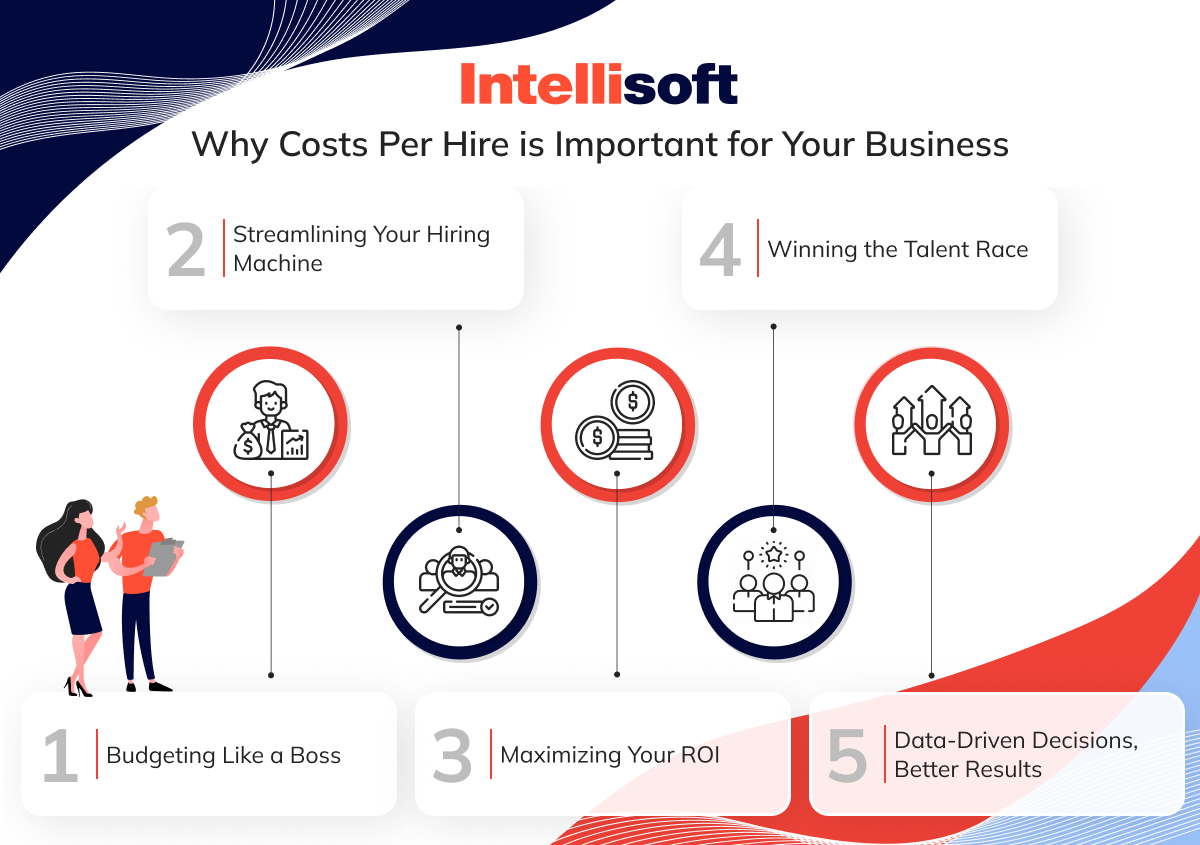
- Budgeting Like a Boss. Knowing your CPH allows you to create realistic recruitment budgets. This means you allocate resources strategically, avoiding unnecessary spending on recruitment activities that might not deliver the best results.
- Streamlining Your Hiring Machine. A high CPH can expose inefficiencies lurking in your hiring process. Analyzing the breakdown of your CPH can pinpoint areas for improvement. Imagine slashing interview rounds, exploring cost-effective recruitment channels, or streamlining onboarding – all leading to a more efficient hiring machine.
- Maximizing Your ROI. Optimizing your CPH essentially means getting more out of your recruitment investment. You’ll attract and hire qualified candidates faster, minimizing lost productivity and maximizing the return you see on your hiring efforts.
- Winning the Talent Race. A streamlined recruitment process with a lower CPH allows you to react swiftly to talent needs. This agility can give you a significant edge in today’s competitive job market, where top talent gets snapped up quickly.
- Data-Driven Decisions, Better Results. CPH is a valuable metric for measuring the effectiveness of your recruitment strategies. By tracking CPH over time, you can assess the impact of changes you make to your hiring process. This data-driven approach allows you to continuously refine your recruitment efforts for better outcomes.
Average Cost Per Hire by Industry Definition
Have you ever wondered what it truly costs to bring a new superstar onto your team? The salary and benefits are just one piece of the puzzle. There’s a hidden price tag associated with the entire recruitment process, encompassing everything from advertising the position to onboarding the new hire. This cost, known as Cost Per Hire (CPH).
Here’s a cost per hire definition: it is a crucial metric for Human Resources departments. It acts as a single number that quantifies the total financial investment made to bring a new employee on board.
CPH takes into account both internal expenses incurred within your organization, like salaries for the recruitment team, and external costs paid to outside entities, such as recruitment agency fees or job board postings. By understanding your CPH, you gain valuable insight into the efficiency of your recruitment process, allowing you to optimize your hiring strategies and make data-driven decisions that attract top talent without overspending.
How Much Does It Cost To Hire an Employee?
The short answer: it depends.
According to a study by the Society for Human Resource Management (SHRM), the average cost per hire in the United States is around $4,700. This figure takes into account a variety of expenses, such as advertising the job, interviewing candidates, and conducting background checks.
However, costs can be considerably higher for executive positions, with some estimates reaching upwards of $28,000 per hire due to the need for more extensive searches and higher recruitment fees.
The National Association of Colleges and Employers (NACE) reported that for companies recruiting on college campuses, the average cost per hire is around $6,275. This higher cost is often attributed to the travel, event planning, and on-campus recruitment efforts required to attract new graduates.
Furthermore, research from Glassdoor suggests that the overall hiring process, including onboarding and training, can lead to an average expenditure of approximately $4,000 per new hire.
The true cost of bringing a new team member on board can vary significantly depending on several factors:
- Industry. Certain industries, like technology or finance, often have higher CPHs due to factors like competitive salaries and specialized skillsets required for open positions.
- Seniority Level. Filling an executive or leadership role will naturally involve a higher CPH compared to an entry-level position. Recruiting efforts for senior positions often involve additional costs like executive search firms, targeted advertising, and longer interview processes.
- Location. Geographic location can also play a role. Hiring in a major city with a high cost of living may necessitate offering competitive salaries and benefits packages, impacting your CPH.
How to Calculate Average Cost Per Hire: Formula
Understanding your Cost Per Hire (CPH) empowers you to optimize your recruitment process and attract top talent without breaking the bank. But before you can leverage this powerful metric, you need to know how to calculate the cost per hire average with the Costs Per Hire Formula.
Here’s how to calculate costs per hire:
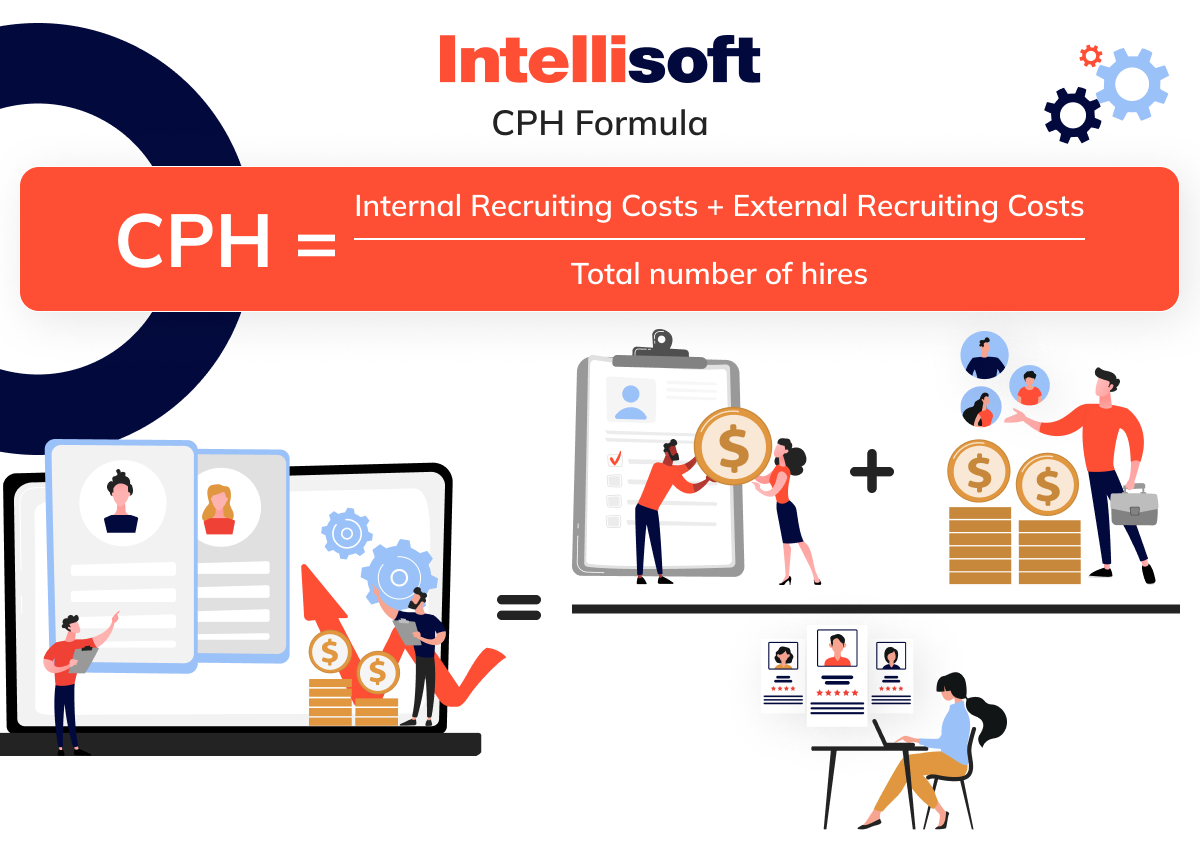
Total Recruitment Costs
This encompasses all the expenses incurred during the hiring process for a specific timeframe, typically a quarter or a year. It’s crucial to consider both internal and external costs – the hidden fees lurking behind every step of the recruitment journey.
Internal Costs
These are expenses incurred within your organization to source, screen, and interview candidates:
- Recruitment Team. This includes salaries, benefits, and any overtime pay associated with the recruitment team’s efforts. From crafting job descriptions to coordinating interviews, their time adds up.
- Advertising & Marketing. Attracting qualified candidates often involves promoting open positions. This includes costs associated with advertising on your company website, social media platforms, or internal job boards.
- Interview Logistics. Securing interview space, scheduling software subscriptions, and training materials used during the interview process all contribute to the internal cost.
- Technology. Applicant Tracking Systems (ATS) used for screening and managing applications, as well as any interview software for virtual interviews, come with associated costs.
External Costs
These are fees paid to external vendors who assist with the recruitment process:
- Recruitment Agency Fees. If you utilize a recruitment agency to source top talent, their fees are factored into your average recruiting cost per hire.
- Job Board Postings. Listing open positions on various job boards can be a valuable strategy, but it comes with a cost.
- Background Checks & Assessments. Fees for conducting background checks, skills assessments, or drug testing on candidates all add up to the external cost.
- Travel & Accommodation. Interviewing top candidates from outside your location can incur travel and accommodation expenses.
- Other Vendor Fees. Additional fees paid to external vendors involved in the hiring process, such as headhunters for executive positions, also contribute to the external cost.
Number of Hires
This refers to the total number of successful hires made within the chosen timeframe for calculating the average cost per hire in technology. Make sure to only include individuals who have officially accepted a job offer and started working for your company. Unsuccessful hires or positions that remain unfilled shouldn’t be factored in, as they skew the true cost per successful hire.
Related Readings:
- What Is Nearshore Outsourcing in Software Development?
- Everything You Need to Know About Team Extension and Dedicated Team Models
- Five Things To Look For In An Ideal IT Offshoring Destination
- Cost to Hire Talent: Staff Augmentation vs In-House Recruitment
- Vendor Selection Process: Essential Criteria for CTOs’ Strategic Choices
Cost Per Hire Calculation Example
Now that you understand the components, let’s see the CPH formula in action:
CPH = Total Recruitment Costs (Internal + External) / Number of Hires
For example, imagine your company spent a total of $45,000 on recruitment activities within the last quarter. Here’s a breakdown:
- Internal Costs. $25,000 (encompassing recruitment team salaries & benefits, advertising costs, interview logistics, interview software subscription)
- External Costs. $20,000 (including recruitment agency fees, job board postings, and background checks)
During the same quarter, your company successfully hired 6 new employees. Here’s how to calculate your CPH:
CPH = ($25,000 + $20,000) / 6 hires = $7,500
Understanding your average recruitment cost per hire empowers you to make data-driven decisions and optimize your recruitment process. By analyzing your internal and external costs, you can identify areas for potential savings and ensure you attract top talent without breaking the bank.
Does Cost Per Hire Work?
The allure of Cost Per Hire (CPH) is undeniable for many talent acquisition teams. After all, consistently tracking internal and external recruitment costs empowers them to create and stick to budgets. Without a clear picture of expenses, it’s easy to overspend on unnecessary recruitment activities.
However, CPH isn’t without its critics. Talent management expert Dr. John Sullivan famously labeled it an “evil” metric, highlighting its potential drawbacks. Here’s a closer look at both sides of the coin:
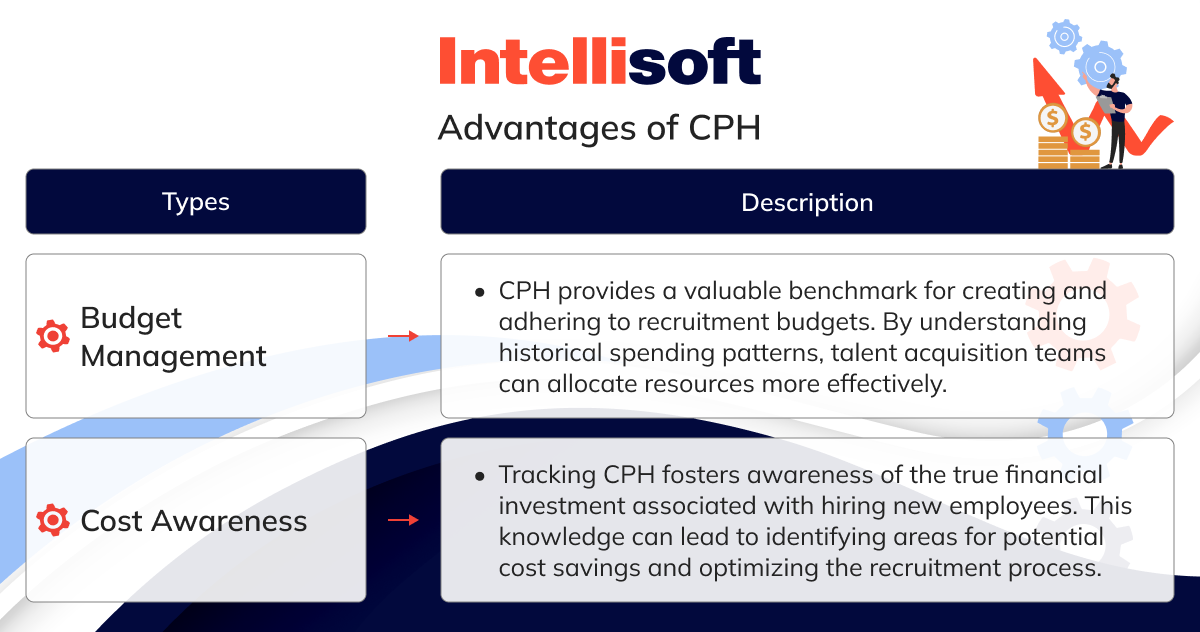
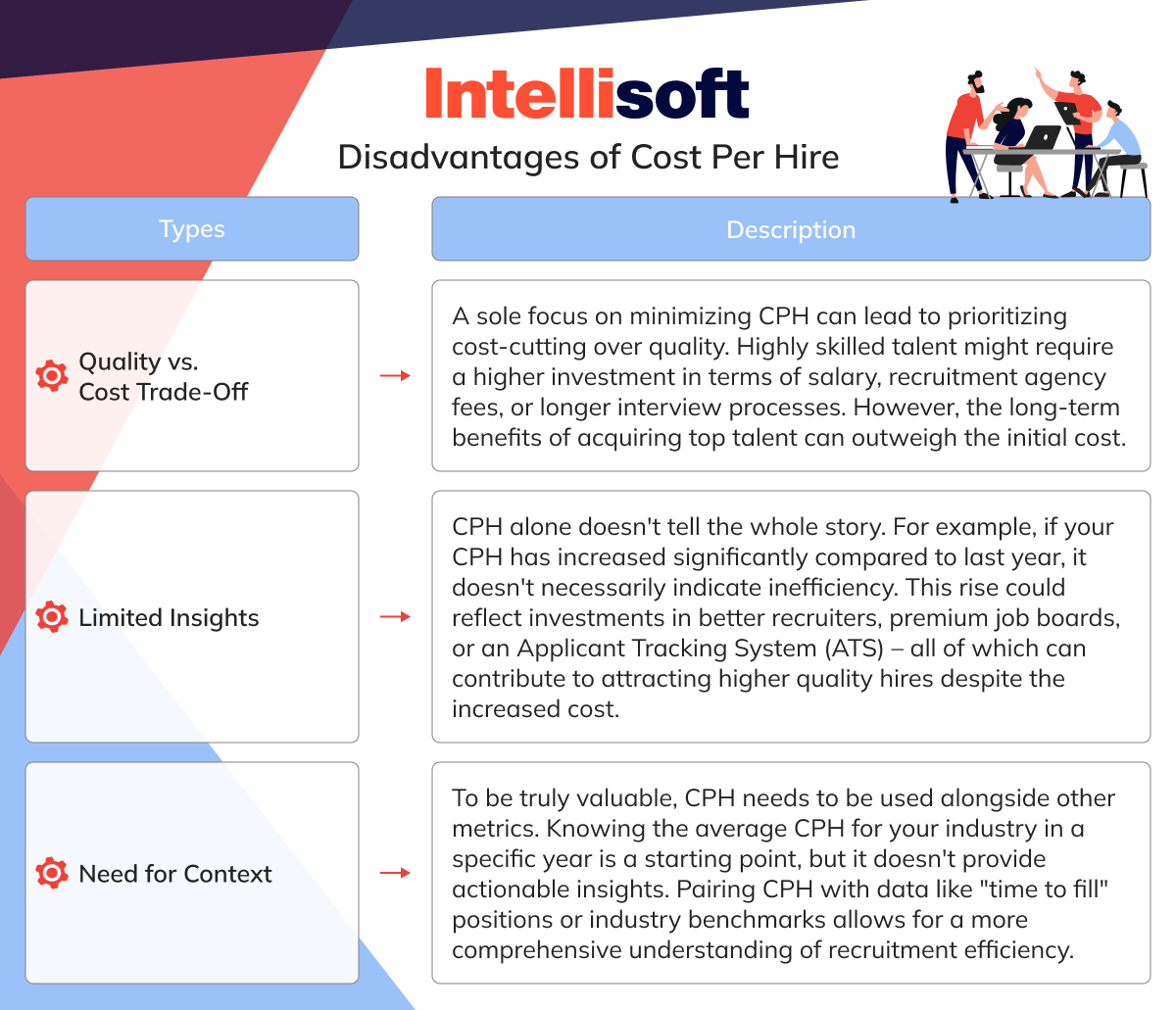
Learn How Outsourcing Can Reduce High Cost-per-Hire
Faced with a high Cost Per Hire (CPH), many companies feel the pressure to squeeze every penny out of the recruitment process. While cost-consciousness is important, focusing solely on minimizing expenses can compromise the quality of your hires. Here’s where outsourcing recruitment presents a compelling solution.
The High Cost of Traditional Hiring
Traditional in-house recruitment often involves a multitude of expenses:
- Recruitment Team Salaries & Benefits. When you hire tech talent through outsourcing, it can be a significant ongoing cost.
- Marketing & Advertising. Posting job openings on various platforms incurs fees.
- Technology Costs. Applicant Tracking Systems (ATS) and interview software require ongoing subscriptions.
The Power of Outsourcing
By outsourcing specific aspects of the recruitment process, you can unlock significant cost savings while potentially attracting higher-quality talent:
- Reduced Overhead. Eliminate the cost of maintaining a full-time recruitment team. Outsourcing allows you to leverage a team of specialists without the burden of salaries and benefits.
- Scalability. Quickly scale your recruitment efforts up or down depending on your hiring needs. Outsourcing partners offer flexibility to adjust resources as required.
- Access to Expertise. Benefit from the expertise of a team specializing in sourcing top talent within your industry. Outsourcing partners have established networks and knowledge to fill specific roles efficiently.
- Improved Efficiency. Focus on your core business while the outsourcing partner handles time-consuming tasks like resume screening and initial candidate interviews. This can significantly reduce your CPH by streamlining the recruitment process.
Optimizing Your Recruitment Strategy
Consider outsourcing specific stages of the recruitment process to maximize your return on investment (ROI):
- Sourcing & Screening. Leverage the expertise of an outsourcing partner to identify and screen qualified candidates, saving your team valuable time.
- Background Checks & Skills Assessments. Outsourcing these tasks ensures a thorough pre-employment screening process without adding to your internal workload.
By strategically integrating outsourcing into your recruitment strategy, you can achieve a healthy balance between cost-effectiveness and attracting top talent. With a reduced CPH and a highly qualified workforce, your organization can unlock its full potential for success.
How Does Outsourcing Work at IntelliSoft?
At IntelliSoft, we leverage a global network of experts to deliver exceptional outsourcing solutions, transforming your vision into reality. Here’s how our process unfolds, ensuring a smooth and successful partnership:
Deep Dive: Understanding Your Needs
The journey begins with a collaborative discovery meeting. We delve into your business, understand your challenges and goals for the project. This open dialogue lays the foundation for a tailored outsourcing strategy that directly aligns with your vision.
Building the Dream Team: Skills & Expertise
Next, we meticulously assess the skills and expertise required for your project. We analyze your technical needs and identify the specific roles essential to achieving your objectives. Our goal is to curate the perfect blend of talent from our global network, ensuring you have the best people for the job, regardless of location.
Matching the Perfect Talent
We leverage our extensive network to embark on the candidate selection phase. We meticulously identify and propose the most suitable professionals for your project, ensuring they possess the requisite technical skills and seamlessly integrate with your company culture. No matter the time zone, language, or location, we find the perfect fit for your needs.
Seamless Onboarding & Integration
Once the ideal team is assembled, we prioritize a seamless onboarding and integration process. This crucial step ensures the outsourced team is fully aligned with your in-house processes, tools, and methodologies. We facilitate a smooth transition, allowing the team to quickly become a vital and functional part of your project.
Efficient Project Execution
With the dream team in place, project execution begins. IntelliSoft meticulously manages all phases of the development process, from initial planning to execution. We ensure adherence to timelines and quality standards, keeping you informed and involved throughout the entire journey.
Continuous Improvement & Client Satisfaction
Finally, we establish a system for continuous performance evaluation and feedback. Regular check-ins and feedback sessions are an integral part of our process. This allows us to adjust strategies as needed, ensuring the project consistently meets or exceeds your expectations. Our iterative approach fosters high performance, continuous improvement, and ultimate client satisfaction.
Partnering with IntelliSoft goes beyond just outsourcing. We become your strategic partner, accelerating the success of your projects through a combination of:
- Global Talent Pool. Access a vast network of experts worldwide, ensuring you have the best people for the job, regardless of location.
- Efficient Recruitment & Cultural Fit. We significantly reduce time-to-hire while ensuring a cultural fit between your company and the outsourced team.
- Stable & Expert Team Commitment. Our focus is on long-term team stability, with dedicated professionals committed to your project for consistent quality and uninterrupted progress.
- Comprehensive Management with Industry Expertise. Our project management team possesses a deep understanding of various industries, ensuring your team aligns perfectly with your project’s timelines, quality standards, and specific needs.
- Cost-Effective, High-Quality Talent. You gain access to top-tier expertise at competitive prices, optimizing your investments.
- Dedicated to Your Success. Our commitment extends beyond service delivery. We focus on accelerating your market presence, enhancing customer satisfaction, and boosting your revenue.
- Seamless Integration & Continuous Support. We ensure a smooth collaboration through seamless team integration and ongoing guidance, maximizing efficiency throughout the project lifecycle.
Ready to unlock the potential of global outsourcing? Contact IntelliSoft today and learn how our world-class talent can help you achieve your goals.


